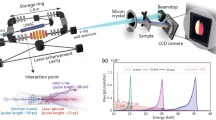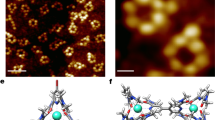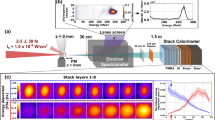Abstract
THE determination of the recoil ranges of atoms resulting from radioactive disintegrations has hitherto been restricted almost entirely to gases, on account of the extremely short range of recoil atoms in solids; in silver, for example, the range of α-particle recoil atoms is of the order of a few hundred angstroms, whilst that of β-particle recoil atoms is many thousandfold less. It is clear, therefore, that absorption measurements and subsequent range determination in solids are possible only if the thickness of the absorbing layer can be varied by amounts corresponding to a small number of molecular layers. It occurred to us that the built-up molecular films prepared by the method of Blodgett and Langmuir1 might serve as adjustable absorption screens of this kind; we have now demonstrated the feasibility of this idea and have obtained preliminary quantitative results.
This is a preview of subscription content, access via your institution
Access options
Subscribe to this journal
Receive 51 print issues and online access
$199.00 per year
only $3.90 per issue
Buy this article
- Purchase on Springer Link
- Instant access to full article PDF
Prices may be subject to local taxes which are calculated during checkout
Similar content being viewed by others
References
J. Amer. Chem. Soc., 57, 1007 (1935); Phys. Rev., 51, 964 (1937).
Author information
Authors and Affiliations
Rights and permissions
About this article
Cite this article
WIDDOWSON, E., GREGG, S. Absorption Method for Determining the Range of Recoil Atoms. Nature 143, 760–761 (1939). https://doi.org/10.1038/143760b0
Issue Date:
DOI: https://doi.org/10.1038/143760b0
Comments
By submitting a comment you agree to abide by our Terms and Community Guidelines. If you find something abusive or that does not comply with our terms or guidelines please flag it as inappropriate.



